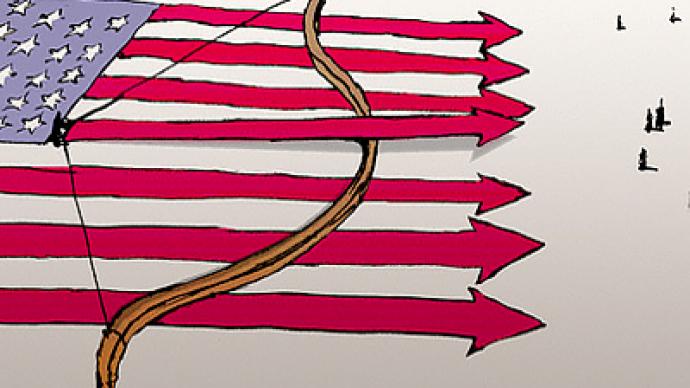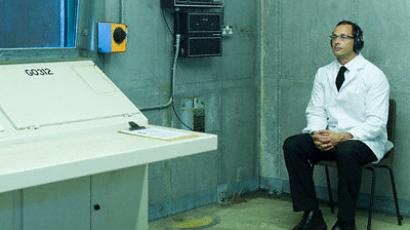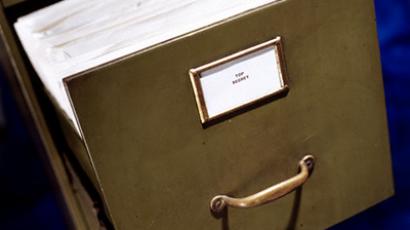America takes aim at Iran as talks begin in Geneva

When it comes to taking military action against Iran, the US seems to come to the brink, only to step back again.
From Bush to the Obama Administration, the message has been that we won't attack Iran--but here's what would happen if we did, economically, politically and public-opinion wise. David Broder of the Washington Post recently penned an editorial praising what war with Iran could do for Obama's public approval ratings and for the struggling US economy."If you start a war in the Gulf, the Iranians will tend to close the shipping lanes of the gulf, they’ll make the tanker routes impossible, and at that point the price of oil shoots up to $500 a barrel, and there’s huge demand for dollars," said Webster Tarpley, an investigative journalist. "So dollars, instead of sloshing around in the gutters of the world, are immediately in demand and you save the dollar for at least a few years.That sounds fantastic, but this is what was done in 1973." George W. Bush may no longer be in the White House, but for Republicans, the Axis of Evil still exists. "Our biggest national security threat is Iran," said Emily Miller, editor of the conservative magazine Human Events. "It's such an unstable government, we have such an irrational dictator there, it's in such a key location, they're supporting Al Qaeda…and with nuclear arms it is such a danger."As talks begin in Geneva regarding Iran’s nuclear program and more cables from WikiLeaks appear, it remains unclear what the Obama administration’s course of action will be. But similarities between the run-up to the 2003 Iraq War and the rhetoric today about Iran are striking, and frightening."One of the similarities is that some of the same people, some of the neoconservatives, John Bolton for example, was clearly one of the people who was on board with regard to the plan with propaganda for war against Iraq, and now he has been a leading voice for attacking Iran," said investigative reporter Gareth Porter. "Clearly that’s a point of continuity between Iraq and Iran as far as war policy is concerned."Contrary to documents made public by WikiLeaks showing many Arab governments have issues with Iran, Phil Wilayto, the editor of The Virginia Defender argued the Arab people actually support Iran and feel threatened by the US and Israel. Arab leaders fear a growth in power by Iran because they are clients of the US, he said. They are promoting the US stance. “Egypt receives the second largest amount of foreign aid of any country, next to Israel. Saudi Arabia has been in the hip pocket of the United States since the 1930s,”said Wilayto. “It’s not surprising they would just parrot the line that they get from the US.”He explained that Iran has the strength and the ability to defend itself. It may not compare to US military strength, but it boasts enough to make Washington pause before attacking. “The bottom line is, just as the problem that the US has with Venezuela, with Cuba, with Bolivia, with Ecuador and with other countries around the world that don’t follow it’s line, Iran is, to use President Obama’s words, defiant,” commented Wilayto.
Media analyst and critic Danny Schechter, who recently returned from Iran, explained Iran is demonized as a threat in the US by the government and the media.“They already assume that the facts are in, that Iran is building a bomb. This is of course the view Israel has taken repeatedly, but the evidence for it is very thin. Iran of course denies it and the very fact that Iran is sitting down for talks in Geneva is an indication of their willingness to discuss these issues. If they were taking this hard line and refused to talk, they wouldn’t be there,” he said. Rather than praise for taking positive steps, Iran is continually attacked. There is an Iran-phobia that drives US policy, Schechter argued. “American policy needs enemies, we need bad guys,” he explained. “We need these threats because these threats justify an expansion of military spending; they justify the voices of the military and hawkish congressman being believed by the American people who are being kept rather ignorant about Iran.”The hype over Iran and possible nuclear weapons is operating much like the playbook used prior to the US invasion of Iraq, he explained. Like Iraq, the media is contributing to the build-up and spread of hype on Iran. “The pres in this country has been intimidated in many ways by both the attacks on the right and voices within big media companies who want to be on the right side of the administration,” explained Schechter.














